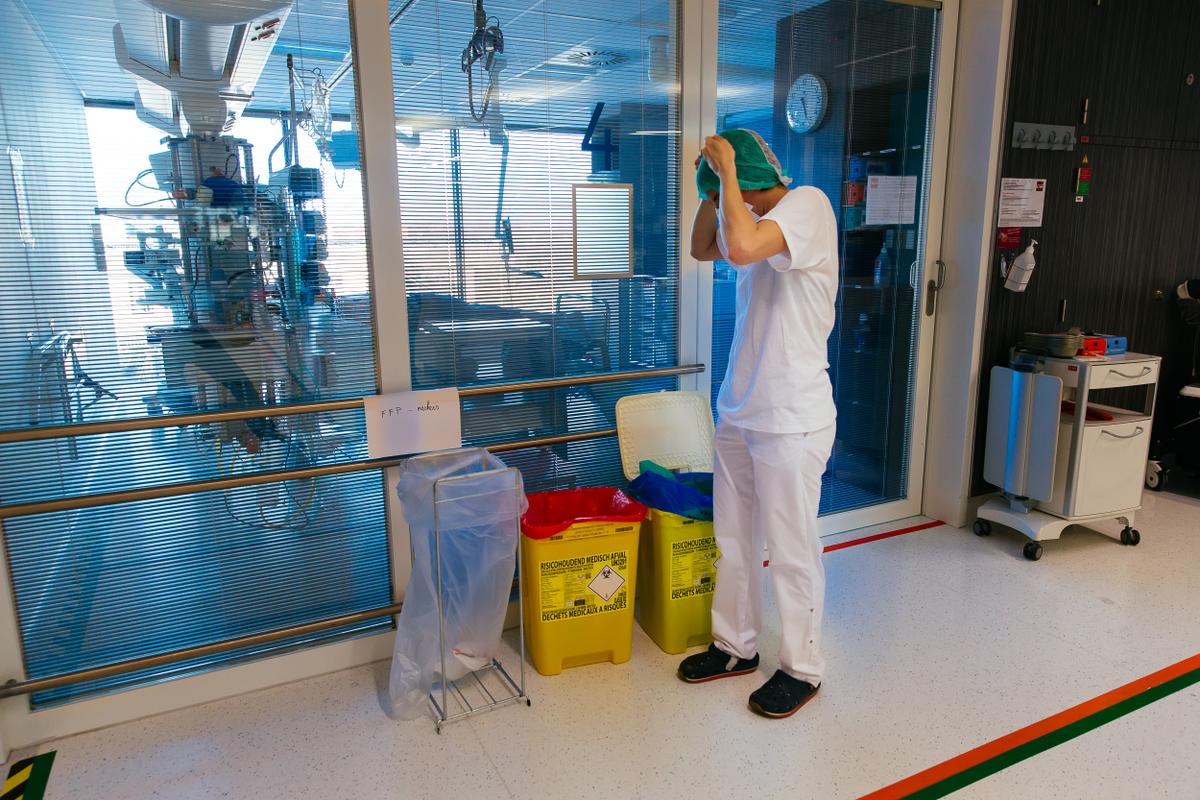The coronavirus does not have the same impact on everyone. The virus can cause an infection without symptoms, or it can be deadly in a matter of days. Research has now shown that it is a deficiency in certain proteins, i.e. the type I-interferon protein, which is a common theme in a big part of these seriously ill COVID-19 patients. These proteins are crucial for the protection of cells and the body against viruses. In part of the patients, the type I-interferon impairment can be explained by the presence of antibodies, another group appears to be carrier of a genetic mutation.
13 genes
Since February, thousands of COVID-19-patients were examined to find out whether there was anything in their genetic make-up to cause the diverging clinical results of the disease. In the first of the two published trials, the researchers analyses blood samples of over 650 patients admitted to the hospital with life-threatening pneumonia as a result of COVID-19. In the end 14 procent of the patients even died. These samples were then compared with samples of 530 patients with an asymptomatic or mild infection. Initially, the researchers looked at differences in the 13 genes known to be crucial for defending the body against influenza.
It quickly became apparent that a considerable number of patients with a severe case of the disease carried rare variants in these 13 genes that control the working of type I-interferon. More than 3 procent of these were missing a functioning gene. Further experiments showed that these patients' immune system did not react properly against COVID-19.
Auto-immune disorder
In a second trial in 987 patients with life-threatening COVID-19 pneumonia, researchers discovered that more than 10 procent had autoantibodies at the start of their infection. These antibodies do not attack the virus but rather the type I-interferons, that protect the body against viruses. The majority of these, 95 procent, were men.
In some cases, the autoantibodies could be detected in blood samples before the patient was infected, in other cases they were found in the early stages of the infection, before the immune system had the chance to react.
These autoantibodies seem to be rare in the general population. Out of 1.227 randomly selected healty persons, only four samples tested positive. "All these findings indicate that these autoantibodies are in fact the underlying reason why people get extremely ill, and not the result of infection with the virus", according to Jean-Laurent Casanova, head of the St. Giles Human Genetics of Infectious Disease laboratory at the Rockefeller University and researcher at the Howard Hughes Medical Institute.
Treatment is possible
The findings, spread over two articles in the scientific journal Science, help explain why some patients are presented with a much more severe case of the disease than other in their age group and regardless of other risk factors. The data also offer the first molecular explanation for the fact that more men die from the disease than women.
"These findings provide convincing evidence that disturbance of the type I-interferon is often the cause of life-threatening COVID-19. This now makes COVID-19 the best-understood acute infectious disease, thanks to a molecular and genetic explanation for almost 15 procent of the critical cases," Casanova says. "In theory such problems can be treated with existing medication and interventions. There are for example two types of interferons available and approved as medication for use in the treatment of certain types of disorders, such chronic viral hepatitis.”
In practice we could include measuring type I-interferons and autoantibodies in the routine diagnostics, so that every COVID-19-patient can get a tailor-made therapy. prof. dr. Isabelle Meyts, paediatric immunologist at UZ Leuven
prof. dr. Isabelle Meyts, paediatric immunologist at UZ Leuven
The team continues to look for genetic variations that could influence other types of interferons or other aspects of the immune response in an unexpected severe case of COVID-19.
COVID Human Genetic Effort
The findings are the first results of the COVID Human Genetic Effort, a running international project with more than 50 genetic centres and hundreds of hospitals around the world, led by Jean-Laurent Casanova and Helen Su of the National Institute of Allergy and Infectious Diseases. Participants to the research include different nationalities from Asia, Europe, Latin America and the Middle-East.
Prof. dr. Isabelle Meyts, paediatric immunologist at UZ Leuven and professor at the KU Leuven, is coauthor for both papers and participated in this ground-breaking research as a member of the international COVID-HGE steering committee. For one of the publications the team led by co-author dr. Leen Moens performed a functional validation examination of the genetic variants in the Lab for Congenital Disorders of the Immune System within the department of Microbiology, Immunology and Transplantation.
Professor Isabelle Meyts: “In theory almost 14 procent of the patients with a severe case of COVID-19 will be provided with an explanation for their unusual reaction to the disease. In practice we could for example include measuring type I-interferon and autoantibodies in the routine diagnostics, so that every COVID-19 patient can receive a tailor-made therapy. In additio, the result of this research will have implication for the treatment with convalescent plasma. It also might explain why the beneficial effect is not as clear-cut.” Prof. dr. Meyts is now leading a task force within the consortium to establish a framework for new clinical trials.
